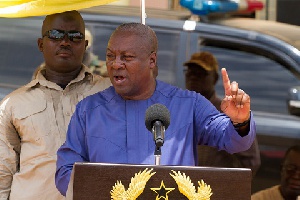President John Dramani Mahama has challenged Ghanaians to name persons in his cabinet who are supposedly corrupt so he can sanction them.
The President argues that his government has chalked some successes in the fight against corruption and must be given credit for that. He said it is worrying to find people accuse his ministers of being corrupt without showing any proof.
President Mahama was addressing the Ghanaian community in the United Kingdom on Friday when he made the comment. The President is currently in the UK for an anti-corruption conference.
He said “all the time people keep saying that your ministers are thieves. Then I ask them, which one? Tell me so I can sanction them. Then their response will be, put your ears down, are you not listening?” President Mahama also reiterated that the fight against corruption should be a collective responsibility on the part of every single Ghanaian.
“We need to deal with corruption in a more systematic manner and that’s why we are putting in place legislation that protects whistle blowers because whistle blowers are important…The Attorney-General’s department is working on the whistle blowers Amendment Bill…The fight against corruption must be systematic and that is what we are doing.”
Corruption menace in Ghana
The NDC government has been accused of condoning corrupt activities which go unpunished.
Some of the corruption related activities associated with government includes shady deals in GYEEDA, Subah, SADA and most recently the bus rebranding saga.
The government has also been lambasted for its appetite for sole sourcing contracts without recourse to procurement laws which some believe breeds corruption.
Transport Minister resigns
The Minister of Transport, Dzifa Attivor resigned in 2015 after her ministry and government came under intense criticism for spending a total of GHc3.5 million of Ghana’s oil money on rebranding of some Metro Mass Transit buses.
I’m fighting corruption
President John Mahama further said his government is committed to fighting corruption in the country. “It is easy to say that there is more corruption in this regime than that regime; but where will comparison of regimes take us? It won’t take us anywhere. The important thing is to put in the systems that prevent corruption from taking place and then have the political willingness to expose it, investigate it, and sanction it.”
General News of Saturday, 14 May 2016
Source: --













